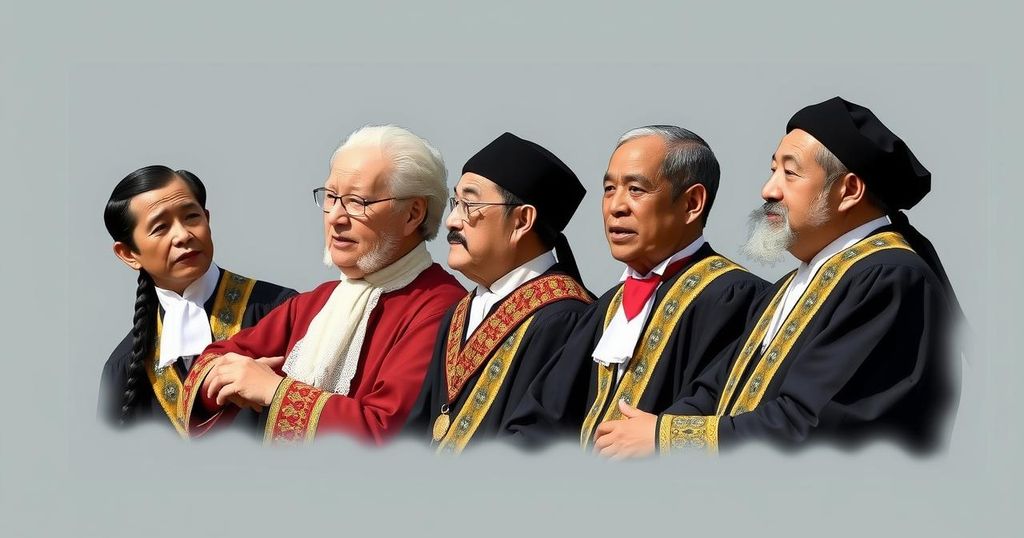Bolivia, the only country that elects its top judges, prepares for a controversial judicial election amidst allegations of politicization and low voter awareness. The election process, which aims to address corruption, instead risks undermining judicial impartiality. Political rivalry has complicated the electoral climate, drawing domestic and international scrutiny. The outcome may reshape Bolivia’s political landscape and offer critical insights for other Latin American nations considering similar judicial reforms.
Bolivia has gained significant attention for being the only nation globally that conducts popular elections for its highest judicial positions. As citizens prepare to vote in the upcoming judicial elections, a striking disconnection is evident; many voters are uninformed about the candidates. Despite the lack of overt campaigning due to restrictions, subtle promotional tactics, such as candidate imagery on food products and slogans embedded within official voting guides, have emerged. They represent an effort to influence a populace largely unfamiliar with the lengthy list of candidates on their ballots.
Historically, the judiciary in Bolivia transitioned from a qualification-based nomination system to one determined by public vote over a decade ago. This was intended to enhance democracy and address corruption within the judicial framework. However, critics argue it has led to a politicized judiciary, undermining impartiality and elevating ruling party dominance instead of advancing democratic principles. Legal experts and analysts from across the region, including those in El Salvador and Honduras, express concerns regarding the integrity of election-based judicial appointments as a threat to democracy.
The upcoming electoral process for Bolivia’s judiciary is fraught with complexities. The election, initially slated for 2023, was delayed after the Constitutional Court—filled with political allies of President Luis Arce—intervened, citing party discord as justification. This maneuver heightened the political tension between President Arce and former President Evo Morales, revealing deep rifts within their party over judicial appointments and influence, as seen in prior controversies where judges made politically charged decisions, notably regarding the legality of Morales’ candidacy in 2019.
As Bolivia prepares for its third judicial election cycle, the atmosphere remains skeptical. Previous elections have seen low voter engagement, with many opting for null or blank votes in response to the lack of transparency surrounding candidate vetting. Observers note that the consequences of these elections extend beyond ballots—having fundamentally shaped Bolivia’s political landscape over the years, particularly as judiciary actions appear influenced by political pressures.
The unfolding events within Bolivia’s judiciary have drawn attention not only domestically but also internationally, as Mexico considers judicial elections within its own legal framework, following significant reforms under President Andrés Manuel López Obrador. The contrasting experiences of both nations could yield valuable lessons for Latin America concerning the problematic confluence of politics and judicial independence. Bolivian officials maintain that despite its unique approach, the election of judges is not entirely unprecedented, as some nations, including the United States, also elect judges, albeit in different contexts.
Should trends in Bolivia influence the Mexican framework, the implications could be profound, particularly as both countries navigate the complexities of political legacy and judicial integrity. The upcoming vote is a critical juncture for Bolivia, symbolizing broader regional challenges and debates about the intersection of justice and political power. Ultimately, the outcomes of these elections hold significant potential for reshaping Bolivia’s democratic landscape in the years to come.
The judicial election system in Bolivia, a unique model where judges are elected by popular vote, has garnered global attention due to its contrasting approach to judicial appointments. Initially introduced to democratize and cleanse corruption from the judiciary, it has drawn criticism for undermining impartial judgments. The reform process has sparked heated debates on the implications for civil liberties and the role of the judiciary as an unbiased entity. The current elections, delayed due to political maneuvering, reflect deeper issues surrounding governance and power within the country, especially in light of historical political conflicts and recent reforms in Mexico that mirror Bolivia’s electoral approach.
The situation surrounding Bolivia’s judicial elections highlights the complex interplay between politics and judicial independence in Latin America. As the nation prepares for a pivotal vote, concerns about legitimacy and transparency loom large, underpinned by a legacy of political manipulation within the judiciary. The outcome of these elections will not only affect Bolivia’s governance but also serve as a critical reference point for other nations in the region, including Mexico, as they navigate their own judicial reforms. Ultimately, the challenge remains to balance the electoral processes while safeguarding the integrity of the judiciary and upholding democratic values.
Original Source: abcnews.go.com






